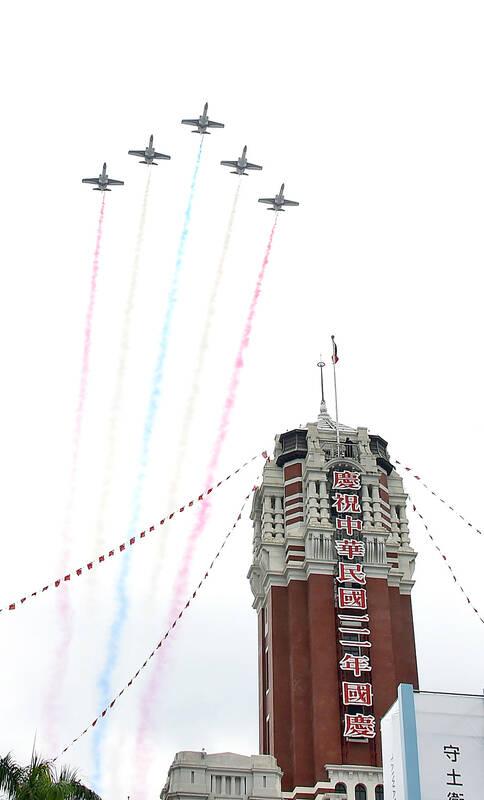Taiwan has dropped two spots to 40th place out of 163 countries in this year's Global Peace Index published by the Institute for Economics and Peace.
The index ranks countries’ level of peace according to 23 indicators across three domains: the level of societal safety and security; the extent of ongoing domestic and international conflict; and the degree of militarization.
Indicators include incarceration rates, UN peacekeeping funding, internally displaced peoples, arms deals and violent demonstrations. Each indicator is ranked from one to five and then averaged, with lower scores indicating more peace and stability.

Photo: Tu Chien-jung, Taipei Times
Despite tensions with China, Taiwan scored 1.73 points, an increase of 0.014 points from last year, but is still considered to be in a “high” state of peace.
Taiwan scored 1.62 in the conflict domain, 1.77 in societal safety and 1.787 in militarization, while scoring 4 in relations with neighboring countries, 2.944 for its incarceration rate and 2.573 for nuclear and heavy weapons.
The Asia-Pacific region was the world’s second-most peaceful behind Western and Central Europe, but its level of peace still declined from a year earlier.
The best performing countries in the region were New Zealand and Singapore, which made it to the overall top 10 list, while Taiwan ranked eighth in the region behind them, Japan, Malaysia, Australia, Mongolia and Vietnam, in that order.
Japan had an overall score of 1.44, placing 12th in the world, and South Korea was 41st with 1.736 points, while China scored 2.093, dropping 11 places to 98th on the index.
The world was less peaceful for a sixth consecutive year, the report said.
Overall global peace is at its lowest level since the index first was published, with 17 countries experiencing more than 1,000 deaths from internal conflict last year, the highest figure since 1999.
Ninety-eight countries have been partially involved in a form of conflict in the past five years, up from 59 in 2008, while 84 countries posted an increase in military expenditures over the prior year.
The best performing country for the 17th year in a row was Iceland, with a score of 1.095, followed by Ireland, New Zealand, Austria, Switzerland, Singapore, Portugal, Denmark, Slovenia and Finland.
The index is published annually by the Institute for Economics and Peace, a global think tank that researches the relationship between economics, business and peace.

A year-long renovation of Taipei’s Bangka Park (艋舺公園) began yesterday, as city workers fenced off the site and cleared out belongings left by homeless residents who had been living there. Despite protests from displaced residents, a city official defended the government’s relocation efforts, saying transitional housing has been offered. The renovation of the park in Taipei’s Wanhua District (萬華), near Longshan Temple (龍山寺), began at 9am yesterday, as about 20 homeless people packed their belongings and left after being asked to move by city personnel. Among them was a 90-year-old woman surnamed Wang (王), who last week said that she had no plans

China might accelerate its strategic actions toward Taiwan, the South China Sea and across the first island chain, after the US officially entered a military conflict with Iran, as Beijing would perceive Washington as incapable of fighting a two-front war, a military expert said yesterday. The US’ ongoing conflict with Iran is not merely an act of retaliation or a “delaying tactic,” but a strategic military campaign aimed at dismantling Tehran’s nuclear capabilities and reshaping the regional order in the Middle East, said National Defense University distinguished adjunct lecturer Holmes Liao (廖宏祥), former McDonnell Douglas Aerospace representative in Taiwan. If

TO BE APPEALED: The environment ministry said coal reduction goals had to be reached within two months, which was against the principle of legitimate expectation The Taipei High Administrative Court on Thursday ruled in favor of the Taichung Environmental Protection Bureau in its administrative litigation against the Ministry of Environment for the rescission of a NT$18 million fine (US$609,570) imposed by the bureau on the Taichung Power Plant in 2019 for alleged excess coal power generation. The bureau in November 2019 revised what it said was a “slip of the pen” in the text of the operating permit granted to the plant — which is run by Taiwan Power Co (Taipower) — in October 2017. The permit originally read: “reduce coal use by 40 percent from Jan.

‘SPEY’ REACTION: Beijing said its Eastern Theater Command ‘organized troops to monitor and guard the entire process’ of a Taiwan Strait transit China sent 74 warplanes toward Taiwan between late Thursday and early yesterday, 61 of which crossed the median line in the Taiwan Strait. It was not clear why so many planes were scrambled, said the Ministry of National Defense, which tabulated the flights. The aircraft were sent in two separate tranches, the ministry said. The Ministry of Foreign Affairs on Thursday “confirmed and welcomed” a transit by the British Royal Navy’s HMS Spey, a River-class offshore patrol vessel, through the Taiwan Strait a day earlier. The ship’s transit “once again [reaffirmed the Strait’s] status as international waters,” the foreign ministry said. “Such transits by